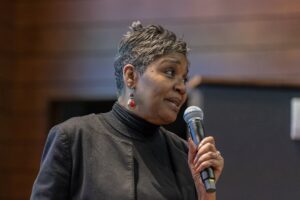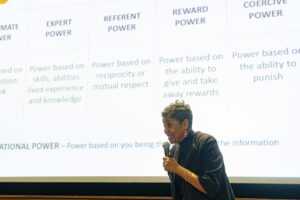
The last time that the HR community at UW–Madison convened for the HR@UW conference was December 3, 2019. For those of you who attended this year’s conference, we hope that the day served not only as an opportunity for you to reconnect with colleagues and to engage in meaningful learning, but also to celebrate your work in community, as “people first.”
Our theme of “Putting People First” was intended to prioritize you—members of the HR community—and also to recognize what we must do as influential members within our predominantly white institution to address inequity. We must work to remove barriers to belonging for those who are marginalized among the wider UW–Madison community, so that all employees have access to full participation and are equitably recognized for their work.
Conference keynote Dr. Dwinita Mosby Tyler spoke to both of these aspects of “putting people first” with her topic: Exploring DEI Proficiency as The New Must-Have HR Skill Set.
“What is the hardest thing about this HR leadership moment in history for you?”
Dr. Mosby Tyler began with this question. In her many engagements with HR professionals around the globe, Dr. Mosby Tyler has noticed common obstacles for people who work in HR. They include:
- Anticipatory grief
- Deficit mindset
- Dwelling on circle of concern
- Recency effect
- Compassion fatigue
- Imposter syndrome
For example, when we spend a lot of mental and emotional energy in the circle of concern, where we don’t necessarily have the ability to do anything about those concerns, we create undue stress for ourselves and risk burnout. She encouraged us to be clear about what we can influence—and more so, what we can control—and to focus our energies there.
The circle of control relates to framework elements (awareness, capacity building, and action) for diversity, equity and inclusion (DEI) work in HR. It is within our control to cultivate awareness—yet we must not get stuck there. It is imperative that we in HR engage in capacity building and action. All three of these framework elements are within our control.
Why are we centering and leading with race?
Dr. Mosby Tyler began to answer this question by telling a story about her grandmother who worked as the housekeeper for a white family in the south. A significant aspect of this family’s history was the fact that they “owned slaves,” i.e., they enslaved people. Some of these enslaved people were relatives of Dr. Mosby Tyler’s grandmother.
Dr. Mosby Tyler grew up with a young white boy from this family who remains part of her life today. They share a history of slavery from two vastly different perspectives. She spoke of their relationship, and how her life experience informs his, and vice versa. Slavery is not ancient history. There is still much work and healing yet to be done.
As we try to address DEI issues today, we often jump from awareness to “allyship”—which is not allyship. Following building awareness, we must first engage in analysis (being mindful not to get stuck there) and establish mechanisms for accountability. True allyship can only follow analysis and accountability for manifesting equity in our workplaces.
Dr. Mosby Tyler cautioned against statements such as, “we need more diversity.” It is more truthful to be specific: “We need to hire and retain people of color” or “We need to hire more women,” etc. The vagueness of “more diversity” is not truthful and keeps us from working toward our goals with accountability.
Liberatory Consciousness
After sharing the imperfect but well-known image of the reality, equality, equity and liberation versions of three people watching a baseball game, Dr. Mosby Tyler invited us to consider: “What are the fences (barriers in the system) we need to be working on today?”
Dr. Mosby Tyler ended her keynote by sharing an equally powerful story about how she wanted to be a ballerina when she was a child. Her mother took her to five ballet schools and all refused her enrollment. Shortly thereafter, a white woman named Miss Anna came to Dr. Mosby Tyler’s predominately black elementary school, and offered to teach ballet in that school. Dr. Mosby Tyler recalled what a difference Miss Anna made in her life. Years later, when Dr. Mosby Tyler was able to thank Miss Anna before she died, Miss Anna revealed that she never knew what an impact she’d had on Dr. Mosby Tyler’s life. To Miss Anna it was a small gesture, but to Dr. Mosby Tyler, it made all the difference.
“You never know when you can be a Miss Anna,” Dr. Mosby Tyler said in closing. “You can be that person in your work.”
Deep Dive
In her breakout session following the keynote, Dr. Mosby Tyler delved more deeply, sharing the various mental models which shape a person’s ability to talk about and operationalize diversity, equity, and inclusion in the workplace.
She also explored one of the “fences” endemic to HR—i.e., that HR has historically been grounded in legitimate and coercive power, when we should instead be developing and exercising expert and referent power. (This is a topic that is explored in the Ethics and Integrity Module of the HR Competencies Cohort Program.)

Those who attended the deep dive left with actionable next steps that speak directly to the question, “What can I do?”
Dr. Mosby Tyler is the Chief Catalyst and Founder of two organizations—The Equity Project and The HR Shop—the former to support organizations in building equity and inclusion strategies and the latter to support non-profits and small businesses with their HR needs. She has over 32 years of human resources experience, including her former role as Executive Director of the Office of Human Resources for the City and County of Denver, where she was the first African American woman to hold that position in the more than 63-year history of the agency. She has a Ph.D. in Organizational Leadership from the University of Colorado, a Master of Arts in Management from Webster University, and a Bachelor of Science in Education from the University of Alabama.
To access Dr. Mosby Tyler’s presentations, go to the WebEx Events conference app, select “Access on the Web” then “Continue with WebEx” and enter your WebEx credentials. Once in the app, select Agenda.
Dr. Mosby Tyler was recommended to be our keynote by Jennifer Sell, a member of OHR’s Cultural Linguistic Services Team, after Jen heard Dr. Mosby Tyler speak at the 2022 Wisconsin Literacy Winter Conference. We too highly recommend Dr. Dwinita Mosby Tyler.
The HR Communities of Practice Office thanks the 2022 Conference Advisory Group for helping to shape this year’s conference, including choice of keynote. The advisory group included: Hope Broadus, Justin Sills, Maddie Walsh, Sharon Hahne, Wanda Manning.